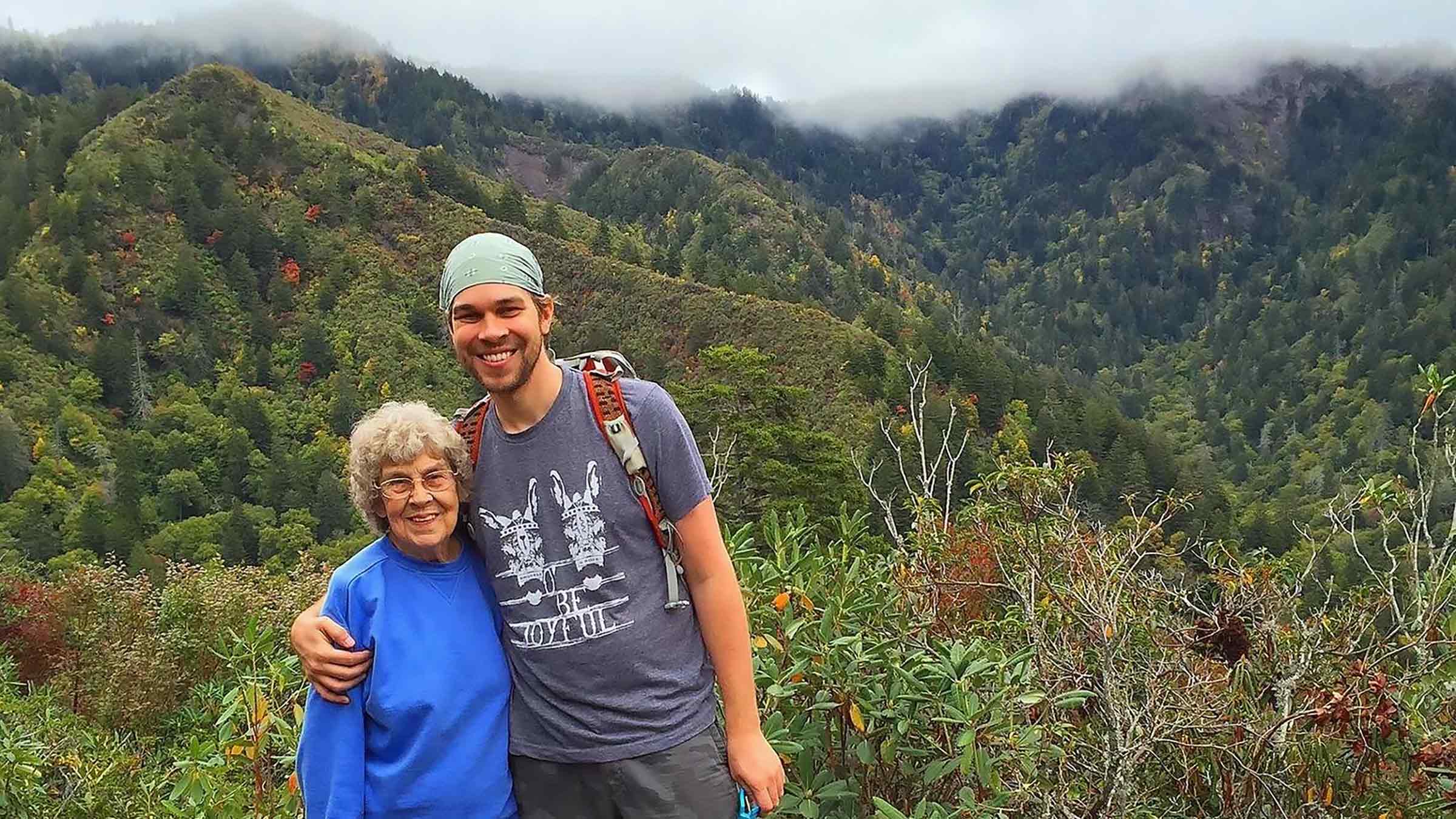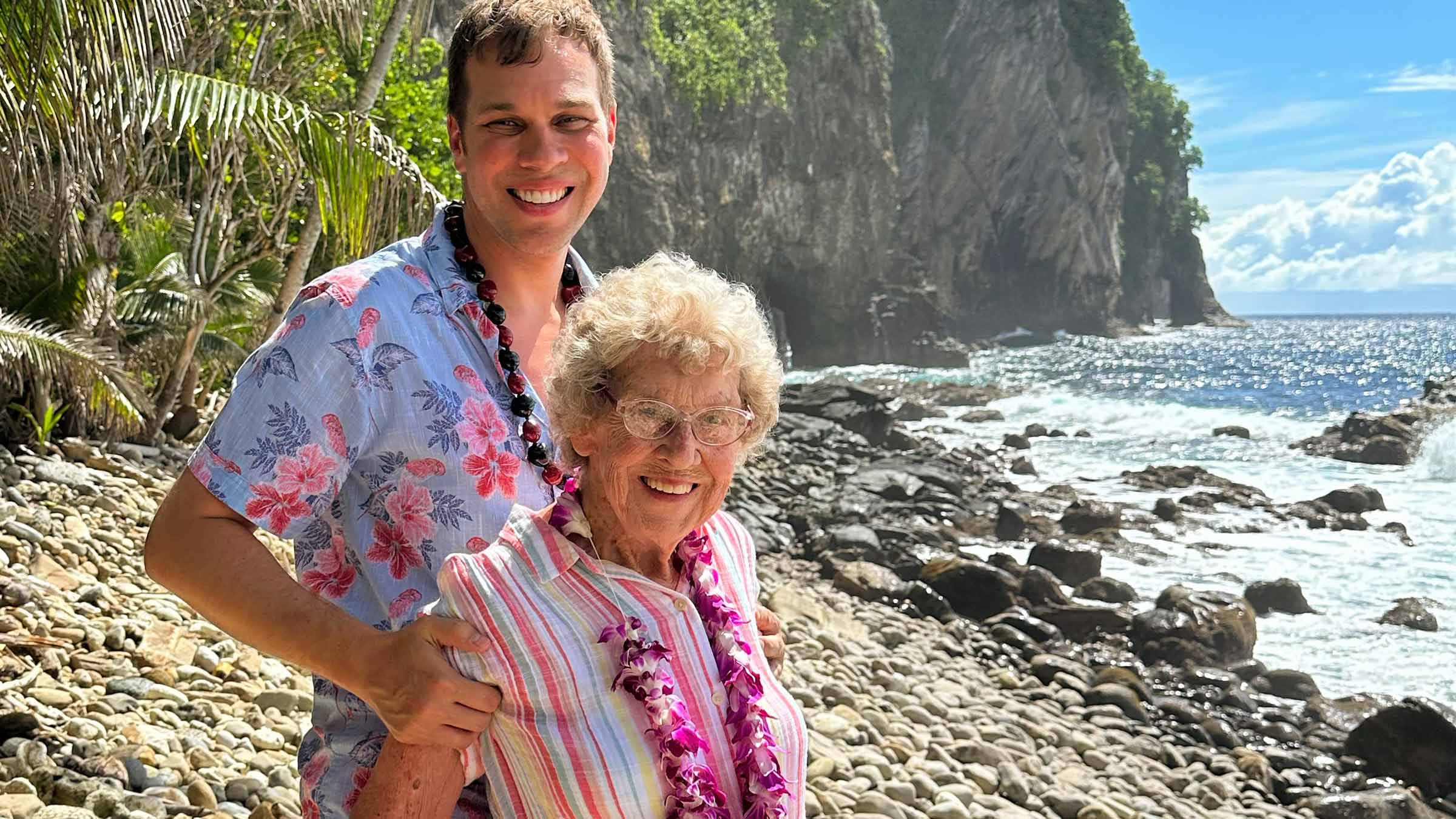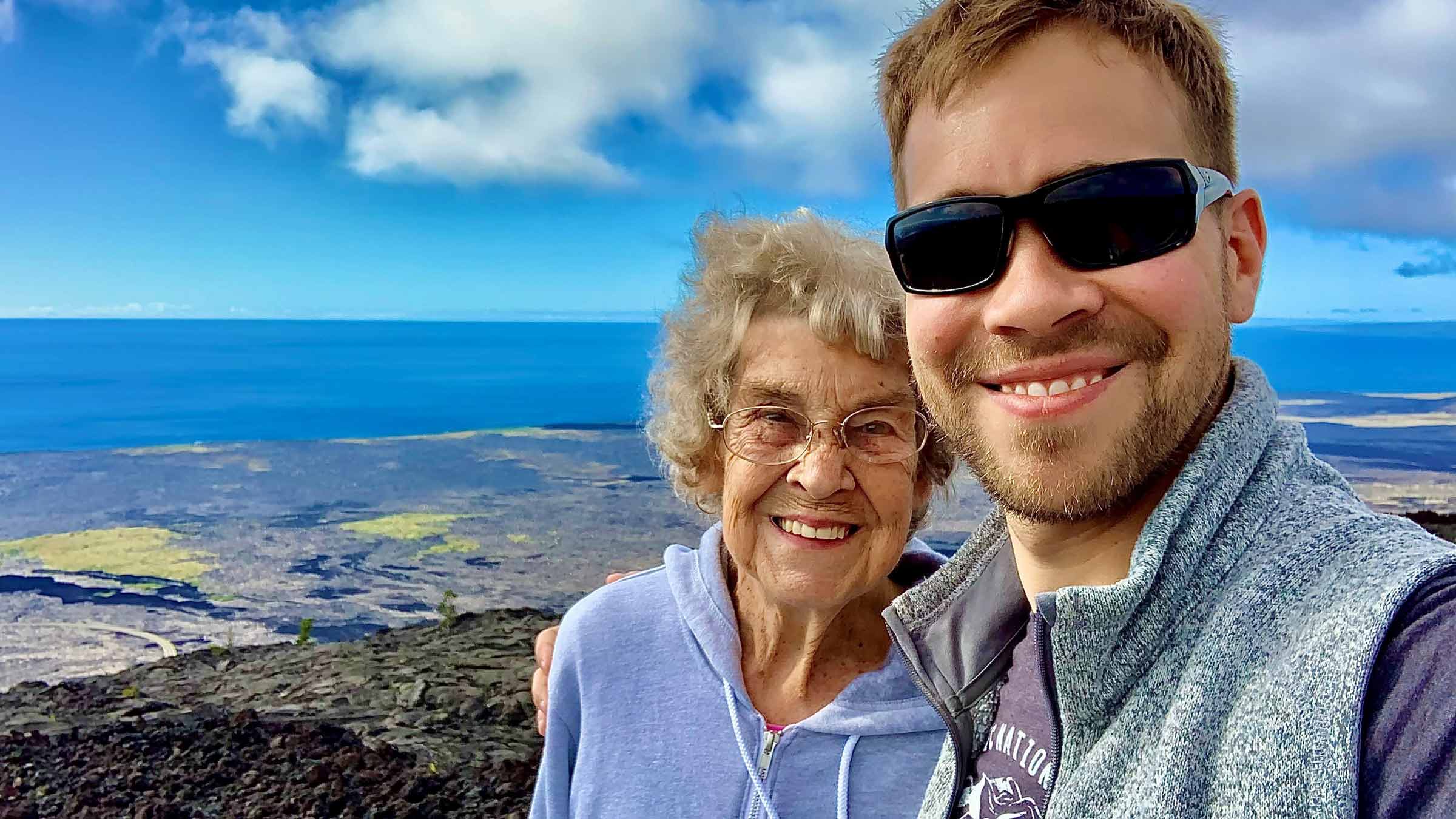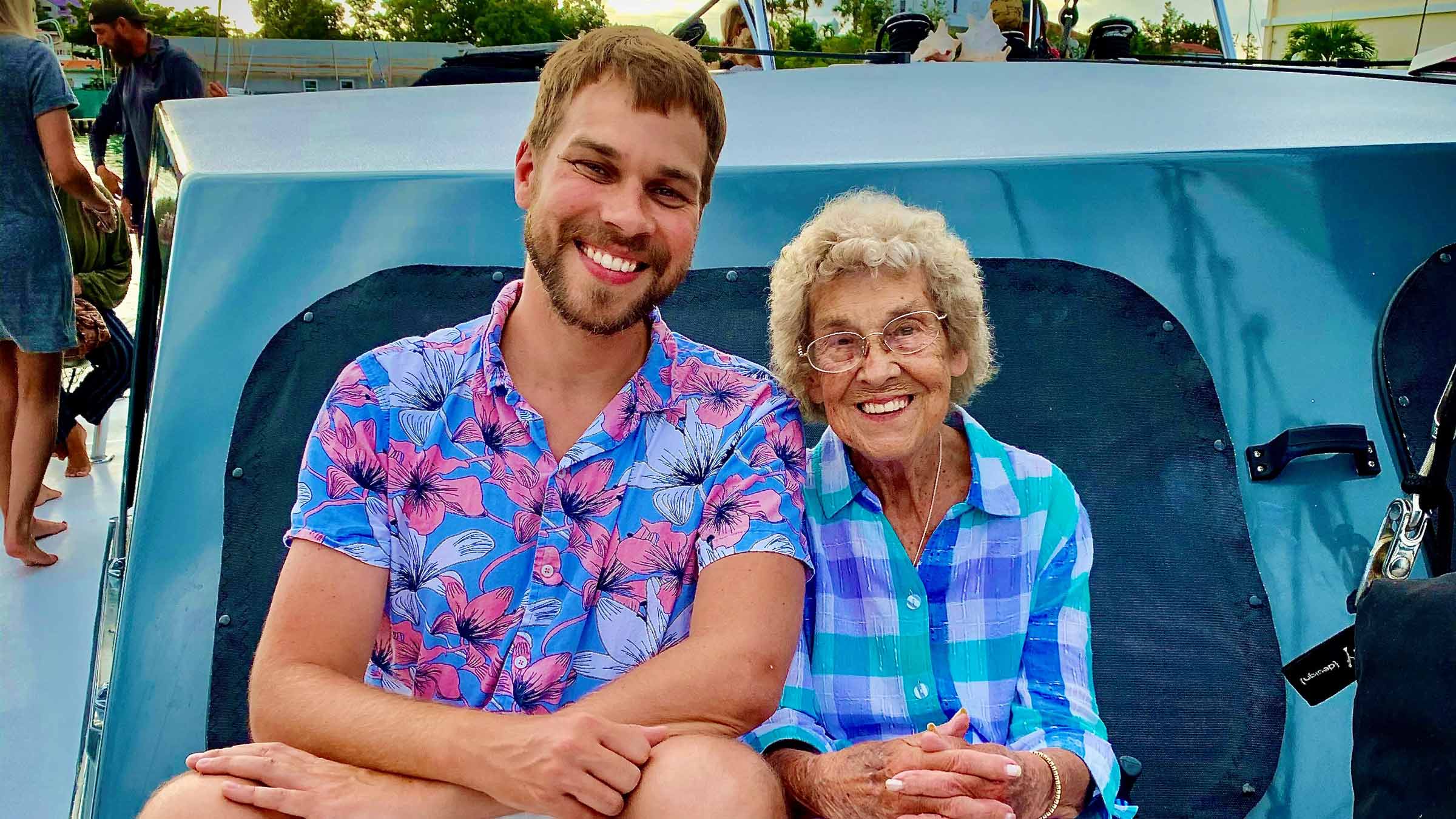How a veterinarian improved his mental health on a national parks quest with Grandma
College of Veterinary Medicine graduate Brad Ryan, MSc, DVM, MPH, shares the lessons he's learned in nature
Grief and anguish had driven Brad Ryan to call his 85-year-old grandmother, Joy Ryan, and offer to take her on a road trip to fulfill her dream of seeing a mountain.
She did more than see that mountain, she reached its summit. And as they celebrated her feat around a crackling campfire in the Great Smoky Mountains, she broke the otherwise silent night to help ease his soul.
“You know what? Your grandpa and I always knew you were gay,” she said to her stunned grandson, then 34. “I may be old but I'm not blind. And what difference does it make anyway? You're my grandson, and I love you.”
As Brad tells the story of that moment in September 2015, he says it was as if his grandmother had pulled off a bandage, in an instant changing their relationship forever.
And when he told the story in 2019 to a reporter chronicling Brad and Grandma Joy’s quest to visit all 63 U.S. national parks, it was as if he was pulling off his own bandage to open up about his mental health.

No stranger to anguish
Now a veterinarian and mental health advocate based in Washington, D.C., Brad Ryan, MSc, DVM, MPH, was a fourth-year student at The Ohio State University College of Veterinary Medicine when he and Grandma Joy visited that first national park.
Their road trip had begun the day Brad learned that a second-year student in the college had died by suicide. While he had never met D.J. Hilton, he was overtaken by grief when he looked at his photos on Facebook.
“Over the last four years at that school, I had grown to be no stranger to anguish myself,” says Brad, who had been plagued by anxiety, chronic depression, impostor syndrome, self-loathing and years of suicidal ideation.
“I grieved alongside my peers that day, but I also was experiencing this deeper uneasiness growing inside of me. The absoluteness of David Hilton's death rattled me because I realized how close I had come to making that same decision.”
Brad says he felt powerless to restore the pieces of his fractured mind, ashamed to reach out to classmates he viewed as infallible. Then he remembered Grandma Joy, with whom he’d shared a close bond during his childhood in rural Duncan Falls, Ohio, and had over the past five years repaired a rift that started when his parents were divorcing.
Connect with the 988 Suicide and Crisis Lifeline 24/7 by calling or texting 988

A journey of mental health discovery
Their camping trip to the Smokies marked the first journey on an adventure that would take the pair across more than 60,000 miles over nearly eight years through the United States, Virgin Islands and finally American Samoa, where “Good Morning America” documented Grandma Joy achieving the status of the oldest person, at 93, to visit every U.S. national park.
It also marked the first step toward Brad’s recovery from the traumas of childhood bullying, systemic homophobia and flawed cultural norms in the veterinary profession.
By 2019, as Brad and Grandma Joy were sharing their story at The Chicago Tribune, he had grown disillusioned with his profession. The idealism with which he entered veterinary college had fallen flat as he faced the day-to-day realities of his first job.
“Soon, mental health became a natural part of our story,” he says. “Shame transformed into power. And the truth that I was expressing became a tool to combat the stigma that had kept me so small for so long.”
Changing his lens to improve mental health
As the opening line of the news article suggested, Brad has embraced a philosophy of “If you don’t like the view, change your lens.”
During a recent keynote address to the Pride Veterinary Medical Community, he offered some of the lessons he’s learned applying that perspective on his travels with his grandmother.
The lens of joy
When the story about Brad and Grandma Joy first gained national attention on Aug. 4, 2019, news coverage was dominated with mass shootings in El Paso, Texas, and Dayton, Ohio. Still, an Instagram photograph Brad shared at Acadia National Park in Maine had been reposted by the park and subsequently went viral. The country, Brad says, chose joy that day.
“There will always be good and bad in the world, light and dark. And choosing to focus on the joyful things in life is a conscious decision that we can make,” Brad says.
“Sharing the joy that we see in the world is a vital component to cultivating that resilience that we're all seeking.”
The ageless lens
While many people use age as a reason to stop fully engaging in life, Grandma Joy, thankfully, never adopted the mindset, Brad says. He’s benefited from her wisdom and perspective during their time together, gotten in touch with his mortality and slowed down to appreciate life in a deeper way.
“Simply put, Grandma Joy has taught me to lean into the possibilities for our age — no matter how big that number gets — rather than the limitations,” he says. “Grandma joy has taught me to widen my lens, and consequently trained my brain to combat the less significant triggers that contribute to depression, anxiety and burnout, all of which are a crisis in corporate America.”

The fearless lens
When invited to take kayaks to observe sea turtles at Virgin Islands National Park, Grandma Joy seemed angry and ungrateful. Her grandson soon learned she had experienced a near-drowning as a child, and was able to reassure her to participate. Years later, at Wrangell-St. Elias National Park & Preserve in Alaska, Grandma Joy was the one convincing Brad to raft on class three rapids.
“Grandma Joy really did teach me about the fearless lens, the fact that we can use our fear as a motivating force, not a limiting force in our life,” Brad says.
“I've been able to apply that fearless lens to my learned anxieties around social rejection and disclosing my sexual orientation to others, really for the first time in my life.”
The lens of resilience
 At Redwood National Park in California, Grandma Joy commented on the massive redwood trees.
At Redwood National Park in California, Grandma Joy commented on the massive redwood trees.
“They’ve been struck by lightning. … That takes courage, after you've been struck by lightning to say, ‘I'm going to keep on growing.’”
The comment came from a woman who’d witnessed alcoholism and domestic violence as a child, was widowed in her 60s, and lost one son to lifelong substance use and another to a brain tumor.
“She never allowed trauma to define her,” her grandson says. “She focused on gratitude, opportunities for social connection in her community. … She just kept growing and thriving, despite the lightning strikes.”
Veterinary professionals, he says, are often overwhelmed by compassion fatigue, perfectionism, lack of work-life balance, and other stressors, and he encourages others to engage in self-empowerment in the face of slow cultural change.
“To see the world for its resilience has been the single greatest game changer in my life. Nature has an abundance of inspirational examples that we can look to for inspiration for resilience,” he says.
“But we can also find those sources of inspiration in our older generations. And it's up to us to seek them out and begin to do that resilience work in our own hearts that will allow us to continue to grow and reach for the sky.”

The lens of grace
In May 2023, as Brad and Grandma Joy prepared to travel to their 63rd and final park, the National Park of American Samoa, he learned that his estranged father, Grandma Joy’s last surviving son, was dying in Louisiana. He initially didn’t plan to visit the man he associated with many painful memories. But as he and his grandmother went about their plans, Brad says he felt a dam break inside him and realized he had inherited a legacy of grievance. They drove 1,200 miles, where Brad thanked his father for teaching him to love animals and exposing him to nature. And then he said words he never imagined he’d say: “Dad, I want you to know that I forgive you.”
“I realized that I alone could break that chain of grievance. Never in my life, up until that moment, have I experienced a more acute transformation than the moment when I said, ‘I forgive you’” Brad says. “I hope I gave him peace. I'm sure I did. But most importantly, and what is not up for debate, is that I set myself free.”
Learn more about Dr. Brad Ryan and his grandmother, Joy Ryan, as they answer questions about their road trip and lessons learned in The Ohio State Alumni Magazine, featuring a variety of stories about Buckeyes, campus news and local, national and international issues with Ohio State connections.

Looking for confidential mental health treatment in a caring environment?
Ohio State's behavioral health team provides comprehensive care backed by one of the nation's leading academic health centers.
Learn more or make an appointment



